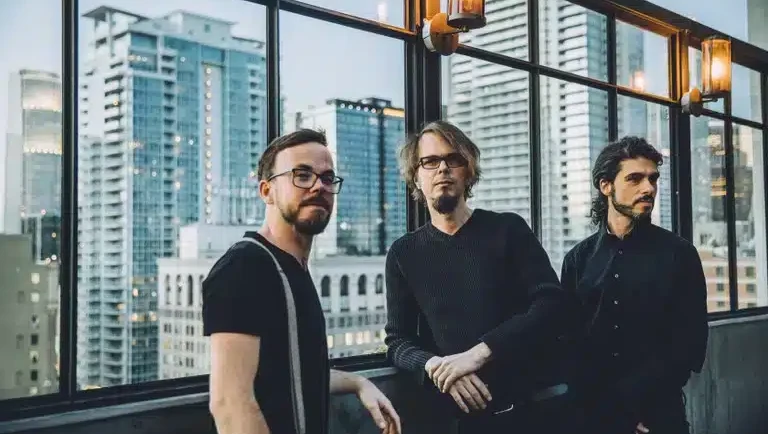
A lot of Austrian musical groups or institutions are celebrating twentieth anniversaries this year, and FAT – the Fabulous Austrian Trio. Guitarist Alex Machacek, bassist Raphael Preuschl, and drummer Herbert Pirker are all in great demand as musicians, and they live in three different countries, on two different continents – but they all see the project as a core element of their musical lives, and manage to schedule a fixed period for it each year.
The band has always had a love for contrasts – complex rhythms and harmonies share space with straight-ahead grooves and melodies that get stuck in your head. They released their fifth album, FAT V, as a digital download in mid-March; Michael Ternai recently spoke to Raphael Preuschl about the band’s countless musical influences, their close communication, and still being able to surprise each other after twenty years.
You’re a man of many projects, but the Fabulous Austrian Trio is one of your longest-lived bands.
Raphael Preuschl: It is. We recorded our first album as a trio, [SIC], in 2004. Alex and I already knew one another; we had met during the recordings for Paul Urbanek’s “The Next Generation of Sound”. I met Herbert while we were both studying at the Vienna Conservatory (MUK).
Alex had worked out a compositional technique where he transcribed drum solos, then harmonized them and wrote melodies to the accents in the solo. On [SIC], he applied it to [drummer] Terry Bozzio solos, and we also wrote a few tracks as a trio. I was playing mostly double bass at the time; our concept was to keep everything fairly acoustic. But that didn’t last long. [laughs]
In any case, it seems like FAT is something of a constant in your work. After all, it’s the project’s fifth album…
Raphael Preuschl: FAT is a band for all of us, not just a “project”. We’re all good friends, and we’ve been through thick and thin together. Alex has lived in Los Angeles since 2004, and in spite of – or maybe because of – the long flight time between us and the limited time we have to work on music together, we’ve stuck with it. We plan a tour at least once a year – twice if possible – and book as many concerts as possible, to keep the band alive. We’ve played in Portugal, on the “Cruise to the Edge”, L.A., Germany, [the Vienna club] Porgy & Bess…we try to see the difficulty as an opportunity.
Was the band’s twentieth anniversary the reason for the album, or did you have it planned anyway?
Raphael Preuschl: We actually recorded the basic tracks in Los Angeles in 2020 at the legendary studio Sunset Sound – Prince, Michael Jackson, The Doors, and Led Zeppelin all recorded there in the 70s and 80s. That was the basis of the album, but then the pandemic came and it didn’t make a lot of sense to release anything, so the whole thing got put off until now. But the 20-year anniversary is a great reason to release the album anyway.
The album sounds very carefully thought-through and arranged. How do you manage that over such a distance?
Raphael Preuschl: We write some new music together in rehearsal, like a rock band. We lock ourselves into the rehearsal studio and jam for a few days, try new ideas out and save them as memos on our phones. Or Alex and I bring compositions as charts to the rehearsal, and we try them out. The bulk of the work happens during production: Alex harmonizes melodies, rearranges parts, and has me record new bass lines from home.
“‘Disco Prog’ is a term we made up ourselves”
Early on, FAT created the genre “disco fusion” to describe the music, but your range has expanded in essentially every direction. Is that openness your trademark?
Raphael Preuschl: “Disco prog” is a tongue-in-cheek term that we made up ourselves, partially to make fun of the way people categorize music – but it does offer a clue to what it is we do. Since there are three of us, our individual backgrounds influence the music. In my case, disco funk is an essential part of my playing: Louis Johnson was one of the reasons I started playing the bass. The first time I heard The Brothers Johnson, when I was 14, it was like being struck by lightning. Later on, I found out that he was Quincy Jones’ favorite bassist, and that he had played on Michael Jackson’s Off The Wall, Thriller, and Bad.
Alex’s incredible sense for polyphony shows in his compositions and in the way he plays. His accompaniments to my solos are masterpieces in themselves. When I listen to recordings of us, I concentrate more on Alex’s comping than on my own solos…[laughs]. I think his harmony comes a lot from Allan Holdsworth, and his rhythm from Frank Zappa. [Guitarist] Harry Pepl once wrote a song called “Man könnte Klavierspielen müssen” [roughly: “You could have to be able to play the piano”]: I think Alex is trying to exceed the limitations of a stringed instrument, to reach the level of polyphony that a keyboard instrument allows. On [SIC], we play a composition of Alex’s called “Piano”.
As I said, I’ve been playing with Herbert for more than 20 years; we’ve been the rhythm section for countless bands. When you have that degree of rhythmic communication with someone, when the individual musicians’ phrasing becomes a unit, the groove gets this powerful momentum that has nothing to do with style. Herbert is an absolute virtuoso of polyrhythm, and the energy of his playing gives us an incredible drive.

“Opposites make the music interesting”
It seems like he – and the rest of you – really show your musical range with the band.
Raphael Preuschl: We aim to manifest opposites in our music. If one passage is very complex, sometimes you need something simple to balance it out – a straight rock or disco groove, for example. In our compositions, Alex and I both try to write melodies that are understandable – that are singable and ideally get stuck in your head. We like to embed them in complex harmonies or rhythms, but it keeps the pieces accessible. It’s really about opposites: fast/slow, high/low, loud/soft, complex/simple. It makes the music interesting.
What’s the biggest difference between working with the Fabulous Austrian Trio and other projects? Do you have more freedom with the trio than with other bands?
Raphael Preuschl: When I sit down to write for FAT, I have the band’s specific sound in my head; I don’t think about liberties I can take with this band that I can’t take with others. I think the special freedom in this band is that we can count on one another one hundred percent. When we’re improvising, we know that whatever risks we take, we’ll always find our way back together. Herbert and I can dissolve the groove completely, but we have a basic trust in one another that we can land on a fat downbeat at the end of a wild passage – even in the second or third bar of the new phrase. Alex and I often spontaneously generate new harmonies when we start playing the harmonic structure more freely.
The greatest freedom we have in improvising is that we’re all in control of our instruments, and that we have the musical understanding to be able to break up forms at any time and put them back together again. That’s another opposite.
To come back to your 20th anniversary once more: can you still surprise each other; do unplanned things still happen in the music?
Raphael Preuschl: Oh, sure; all the time. In 2022 we were playing Alex’s piece “Yellow Pages” at the Kulturmue in Hollabrunn – a relatively calm, jazzy piece, with a five-bar phrase. At the beginning, we play the chords as whole notes, and then put an accent on the downbeat of the fifth bar. At that concert, none of us played a tone or a beat at all at the beginning, just a few colors and textures – and then, out of the blue, we all landed together on that downbeat. Five or six times in a row. The pulse was totally present, without any of us having to define it. Those are the kind of things that happen when you’ve been playing together for a long time.
Interview by Michael Ternai, translated and adapted from the German original by Philip Yaeger.
